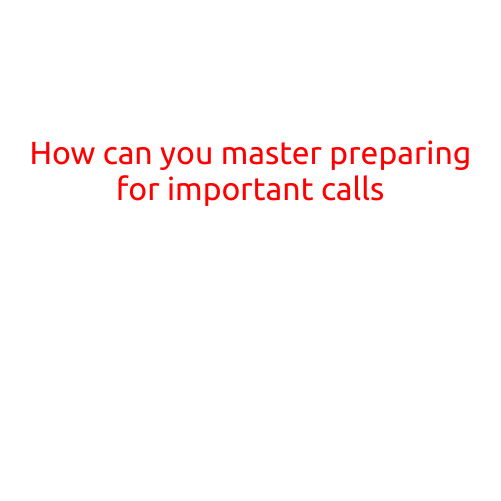
How Can You Master Preparing for Important Calls?
In today’s fast-paced and competitive business world, staying ahead of the game requires more than just having a conversation. Successful business professionals know the importance of being well-prepared for important calls, especially those that can make or break deals, seal partnerships, or resolve critical issues.
Preparation is key to mastering the art of making important calls. It’s not just about knowing the facts and figures, but also about understanding the context, being aware of the audience, and having a clear objective in mind. In this article, we’ll provide you with actionable tips to help you master preparing for important calls.
1. Clearly Define Your Objective
Before making the call, define what you want to achieve. What is your purpose? What specific outcome do you hope to get out of the call? Make sure you’re crystal clear on your objective, so you can stay focused and avoid going off track.
2. Research and Gather Information
Do your homework! Research the company, the person you’ll be speaking with, and the industry. Gather relevant data, stats, and information that will help you make a strong case or address concerns. This will not only demonstrate your expertise but also show that you’re genuinely interested in the conversation.
3. Anticipate Questions and Challenges
Think about the potential questions and challenges you might face during the call. Prepare thoughtful responses and counterarguments to address any concerns or objections that may arise. This will help you stay confident and composed, even when faced with tough questions.
4. Practice Your Pitch
Rehearse your pitch, whether it’s a sales pitch, a proposal, or a presentation. Prepare a clear, concise, and engaging script that effectively communicates your message. Practice your tone, pace, and body language to ensure you project confidence and authority.
5. Prepare for Different Scenarios
Be prepared for unexpected twists and turns. Think about different scenarios that might unfold during the call, and how you’ll respond to each one. This could include handling objections, negotiating terms, or addressing concerns.
6. Choose the Right Time and Location
Schedule the call at a time that works best for both parties. Ensure you’re in a quiet, private location with minimal distractions. This will help you stay focused and avoid interruptions.
7. Use Technology to Your Advantage
Take advantage of technology to enhance your call experience. Use video conferencing tools to create a more personal connection, or invest in a high-quality headset for crisp and clear audio.
8. Active Listening
Make sure to listen actively and attentively to the other person. Pay attention to their words, tone, and body language. Take notes and ask clarifying questions to ensure you understand their concerns and needs.
9. Stay Organized
Take notes during the call to ensure you capture important points and action items. Keep all relevant documents and files organized, so you can quickly reference them if needed.
10. Follow Up
After the call, send a summary email or follow-up note to confirm discuss topics and action items. This will help keep the conversation alive and demonstrate your commitment to the relationship.
By mastering these tips, you’ll be well-prepared to make a strong impression during your important calls. Remember to stay focused, organized, and confident, and you’ll be on your way to achieving your goals.
The Bottom Line
Preparing for important calls requires a combination of research, planning, and practice. By following these tips, you’ll be able to stay ahead of the game and make a lasting impression. Whether you’re in sales, customer service, or any other field, mastering the art of preparing for important calls will take your career to the next level.





